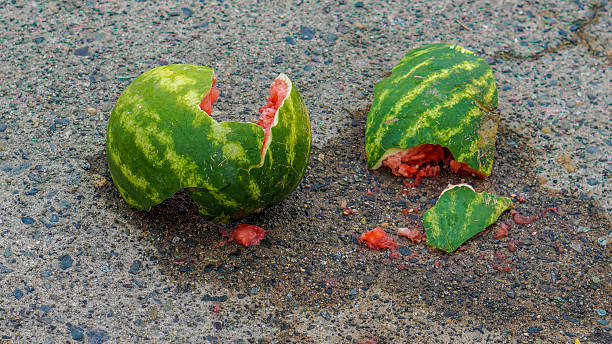It’s not unusual to be caught in a con while traveling abroad. But knowing the usual scams, con artists come up with helps us avoid it altogether. While there are several scams around, let’s talk about the infamous melon drop scam.
The melon drop scam targets Japanese tourists. Con men would buy a cheap watermelon, bump into Asian tourists and ask for $100 for the broken fruit. They take advantage of the fact that fruits in Japan are more expensive.
What is the Melon Drop Scam?
Scammers are always on the lookout for new opportunities to scam tourists and get a good payout. When con men learned that Japanese tourists were willing to pay $100 for a well-preserved watermelon.t Con artists would purchase a watermelon for $2 and then bump into a Japanese tourist, causing them to drop and break their allegedly expensive watermelon. They would then pressure their victim into paying between $50 and $100 for their spoiled fruit. (Source: Ask Men)
This scam is easy to accomplish because any decent person who bumps into a stranger and breaks an expensive item would offer compensation. When people break things, they tend to feel responsible, which is precisely what melon drop scammers depend on.
The modern form of this fraud entails putting worthless, broken glass in a box and packaging it nicely. Scammers scan the crowd for someone who isn’t paying attention and collide with them, making it appear as if it was the victim’s fault. (Source: List Verse)
They then explain that the box contains an expensive and fragile item, typically a gift for their mother, boss’s wife, dying grandma, or someone. They may even produce a receipt to confirm the item’s worth.
The melon scam is a variation of the Chinese Pengci scam. By definition, the word pengci means breaking porcelain. The term was brought about by describing a practice employed by scammers who would wait outside busy markets with fragile porcelain containers and demand money when they broke, presumably due to the negligence of others. (Source: The Guardian)
Today, pengci has evolved. Some would throw themselves onto incoming vehicles to obtain compensation. This is a widespread trend in China, to the point where comparable compilations of clips are now nearly as famous online as cat videos.
How to avoid Scams as a Tourist
The melon drop scam, as well as other tourist scams, can be easily avoided. Here are a couple of useful tips to avoid being scammed when on your vacation. (Source: Native Travellers)
Try to avoid common tourist destinations.
Popular tourist spots, landmarks, and attractions are frequently densely packed with con artists and pushy sellers. Once you divert off the tourist trail, scammers and sales pitches usually stop.
Be mindful of overly friendly locals.
It would help if you were wary of unusually friendly approaches that appear odd. Often, this will direct you into a scam. Sometimes it’s difficult to tell the difference, but trusting our gut instincts has served us well in the past. (Source: Native Travellers)
Avoid looking like tourists.
Wearing pricey jewelry and displaying expensive equipment attracts scammers’ attention. Avoid unnecessary attention by leaving jewelry and bulky cameras at home. If you must bring valuable goods with you, keep them discreet and be cautious about using them.
Stay polite and composed all the time.
The majority of scammers are simply trying to make ends meet for their families, and they, too, are human. Maintaining a polite demeanor can help prevent a bad situation from developing into an argument in a dangerous environment. If you believe you have been approached by a scammer, politely decline any offer with a confident tone. (Source: Native Travellers)
